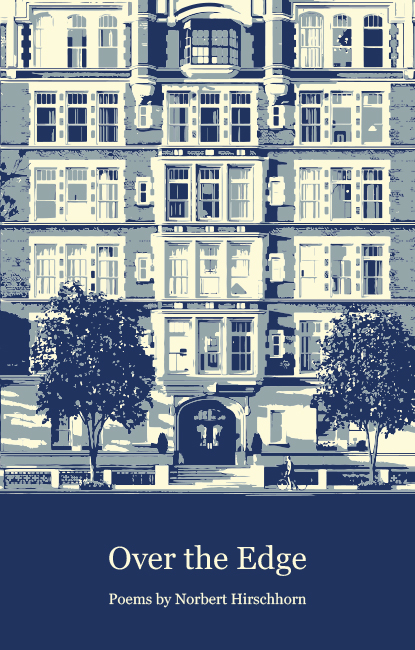Norbert Hirschhorn
Holland Park Press (£10)

Poet Norbert Hirschhorn’s parents fled from Austria just before the Holocaust and resettled in New York when Hirschhorn was ten. He went on to become a social services physician who was honored for developing a treatment for cholera; later in life, he started writing poetry and has published several books. His latest collection, Over the Edge, is not an easy read, but it is compelling. The edge that the poet and his parents go over is from normal life as survivors (albeit temporary ones), toward Hirschhorn’s visionary descriptions of what may be waiting on the other side. (Hint: It is not heavenly peace.)
The section of poems entitled “853 Riverside Drive (New York City)” offers an unflinching memoir of death and its precursors, depicting the anything but hopeful strivings of a young emigrant. Hirschhorn helps his mother with the laundry, where he would “edge over to the waist-high / parapet, and imagine myself flying to the next building / over. It was my first sense of suicide.” He is not alone:
Sitting at my 8th grade homework in the alcove by
The kitchen I smelled something strange. I turned.
To see my mother sitting calmly, wearing her new
housecoat, her chair facing the gas-oven door.
Hirchhorn’s father leaves the family but eventually returns to die at 853 Riverside Drive. The poet reviews his father’s body for the last time before it is “lowered into the ground, followed by / dirt, rocks, prayers and perpetual darkness”; in the next stanza, Hirschhorn the medical student compares dissecting a corpse to carving a Thanksgiving turkey. Perhaps as a sort of atonement for his disrespect for his father, Hirschhorn includes a poem titled “Tahara,” a formal death Jewish ritual:
the body laid in a plain pine box.
The family kissed his head in reverence.
Tahara, a gift to the bereaved, done.
The body now ready for burial at sundown.
Some of the most arresting poems in Over the Edge describe conversations with death as vivid dreams, as in the last lines of “The Call,” where we get both sides of the story:
Please, give me some ease.
None to be had.
Then let me ask you something.
Go ahead.
Why does it take me so long to leave the house?
You know, forget this, forget that, recheck the stove,
Go back for the umbrella . . .
You’re afraid you’ll die.
I am afraid.
Good then. Let’s go.
In “I Dream Of Him In Lightness and Dust,” Hirschhorn calls up death as a rather suave fellow, but one the poet would rather not meet:
Before me now, arms outstretched.
I want to fall on his breast, panting, crying,
bury my face in his sweet-smelling neck.
Instead, we press our hands together,
my right hand between his, his between mine.
For this is the manner, this is the custom
how the dead greet the dead.
Dramatic in the best sense of the word, Over the Edge is written to be spoken and meant to be heard. With a physician’s candor and the complex perspectives of a child of survivors, Hirshhorn offers a roadmap to a vacation that few of us want to take.
Rain Taxi Online Edition Spring 2024 | © Rain Taxi, Inc. 2024
